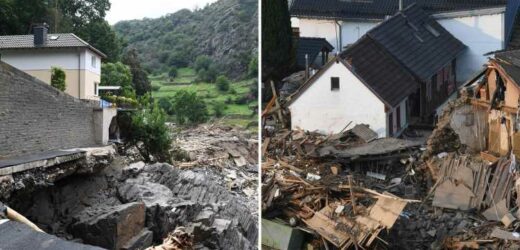GERMANY flood warnings reportedly did not reach locals in time before the rain hit – with more than 170 people still missing in the killer deluge.
Warning systems sent out alerts a few days before the heavy rain hit, but failed to reach many residents or officials in time, according to BBC reports.
More than 180 people were killed in the deluge, with more than 170 still missing as the devastating clean-up effort begins.
Armin Schuster, head of the Federal Office for Civil Protection, said "the warning infrastructure wasn't our problem, but the effectiveness with which authorities and the population reacted to these warnings".
“We sent out 150 warnings via our apps, via the media,” he said.
However, Schuster said it was impossible to predict even half an hour ahead which places would be hit hardest.
Critics have now questioned the usefulness of warning apps, as the floods severed many phone links.
And the opposition Green Party said the disaster showed Germany must prepare better for extreme weather events.
However, Germany’s government has hit back at criticism over its warning systems, with Interior Minister Horst Seehofer calling the criticism "cheap election rhetoric".
"It would be completely inconceivable for such a catastrophe to be managed centrally from any one place – you need local knowledge," he said.
Talks around the effectiveness of the warning systems come as Chancellor Angela Merkel visited flood-hit areas on Monday, including a reservoir dam in western Germany at risk of collapse.
The death toll in Germany has risen to at least 180 overnight during the country’s worst natural disaster in decades.
Around 4,500 residents in villages near the Steinbach reservoir in North Rhine-Westphalia, Germany, were told to evacuate their homes amid fears that the 57ft dam could collapse.
Local authorities said the situation was “stable but not uncritical” after cracks were spotted in the dam yesterday. The area has seen three months of rainfall in a week.
Elsewhere, some 110 people were killed in the worst-hit Ahrweiler district south of Cologne, with police expecting to find more bodies as the flood waters recede.
Entire communities in the states of Rhineland Palatinate and North Rhine-Westphalia have become cut off from power in the past several days. In North Rhine-Westphalia at least 45 were killed during the flooding.
Ms Merkel this week travelled to Rhineland Palatinate, which is home to the flood-ravaged village of Schuld, where she inspected the damage and met with locals.
Although rain has stopped in the worst-affected areas of Germany, Belgium and the Netherlands, storms and downpours have persisted in other parts of western and central Europe.
Sunday night saw flooding in the German-Czech border area and in Germany's southeastern corner and over the border in Austria.
Some 65 people were evacuated in Germany's Berchtesgaden area after the Ache River swelled – with at least one person killed.
In Austria, a flash flood swept through the town of Hallein late last night, but there were no reports of casualties.
Chancellor Sebastian Kurz said on Twitter that heavy rain and storms were continuing to cause serious damage in several parts of Austria.
A massive clean-up effort is underway across those areas affected by the deluge, with German media reporting oil pollution of rivers, including parts of the Whine, from heating oil in flooded cellars and abandoned cars.
A priority was the provision of drinking water, with damaged water pipes in some of those affected areas damaged.
The government was reportedly considering an aide package of around €400m (£344m; $470m).
Source: Read Full Article









